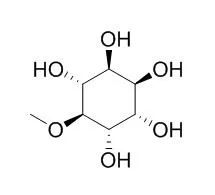| Description: |
D-Pinitol is a safe nutrient to reduce calorie consumption when supplementing with creatine. It exerts anti-inflammatory, insulin-like activities; and inhibits osteoclastogenesis from bone marrow stromal cells and macrophage cells, which in turn protect bone loss from ovariectomy. It inhibits the activation of p38, JNK, and NF-κB, the expression of p53, Bcl-2, Bax and NF-kB proteins, and reduces focal adhesion kinase (FAK) phosphorylation, c-Src kinase activity. |
| Targets: |
GLUT | Src | NF-kB | FAK | p53 | Bcl-2/Bax |
| In vitro: |
| Int J Mol Sci. 2013 May 8;14(5):9790-802. | | D-pinitol Inhibits Prostate Cancer Metastasis through Inhibition of αVβ3 Integrin by Modulating FAK, c-Src and NF-κB Pathways.[Pubmed: 23698767] | Prostate cancer is the most commonly diagnosed malignancy in men and shows a predilection for metastasis to the bone. D-Pinitol, a 3-methoxy analogue of d-chiro-inositol, was identified as an active principle in soy foods and legumes, and it has been proven to induce tumor apoptosis and metastasis of cancer cells.
METHODS AND RESULTS:
In this study, we investigated the anti-metastasis effects of D-Pinitol in human prostate cancer cells. We found that D-Pinitol reduced the migration and the invasion of prostate cancer cells (PC3 and DU145) at noncytotoxic concentrations. Integrins are the major adhesive molecules in mammalian cells and have been associated with the metastasis of cancer cells. Treatment of prostate cancer cells with D-Pinitol reduced mRNA and cell surface expression of αvβ3 integrin. In addition, D-Pinitol exerted its inhibitory effects by reducing focal adhesion kinase (FAK) phosphorylation, c-Src kinase activity and NF-kB activation.
CONCLUSIONS:
Thus, D-Pinitol may be a novel anti-metastasis agent for the treatment of prostate cancer metastasis. |
|
| In vivo: |
| Int Immunopharmacol. 2012 Mar;12(3):494-500. | | D-pinitol inhibits RANKL-induced osteoclastogenesis.[Pubmed: 22269833] | Numerous studies have indicated that inflammatory cytokines play a major role in osteoclastogenesis, leading to the bone resorption that is frequently associated with osteoporosis. D-Pinitol, a 3-methoxy analogue of D-chiroinositol, was identified as an active principle in soy foods and legumes.
METHODS AND RESULTS:
Here we found that D-Pinitol markedly inhibited the receptor activator of nuclear factor kappa B ligand (RANKL)-induced osteoclastic differentiation from bone marrow stromal cells and RAW264.7 macrophage cells. In addition, D-Pinitol also reduced RANKL-induced p38 and JNK phosphorylation. Furthermore, RANKL-mediated increase of IKK, IκBα, and p65 phosphorylation and NF-κB-luciferase activity was inhibited by D-Pinitol. However, D-Pinitol did not affect the proliferation and differentiation of osteoblasts. In addition, D-Pinitol also prevented the bone loss induced by ovariectomy in vivo.
CONCLUSIONS:
Our data suggest that D-Pinitol inhibits osteoclastogenesis from bone marrow stromal cells and macrophage cells via attenuated RANKL-induced p38, JNK, and NF-κB activation, which in turn protect bone loss from ovariectomy. |
|






 Cell. 2018 Jan 11;172(1-2):249-261.e12. doi: 10.1016/j.cell.2017.12.019.IF=36.216(2019)
Cell. 2018 Jan 11;172(1-2):249-261.e12. doi: 10.1016/j.cell.2017.12.019.IF=36.216(2019) Cell Metab. 2020 Mar 3;31(3):534-548.e5. doi: 10.1016/j.cmet.2020.01.002.IF=22.415(2019)
Cell Metab. 2020 Mar 3;31(3):534-548.e5. doi: 10.1016/j.cmet.2020.01.002.IF=22.415(2019) Mol Cell. 2017 Nov 16;68(4):673-685.e6. doi: 10.1016/j.molcel.2017.10.022.IF=14.548(2019)
Mol Cell. 2017 Nov 16;68(4):673-685.e6. doi: 10.1016/j.molcel.2017.10.022.IF=14.548(2019)